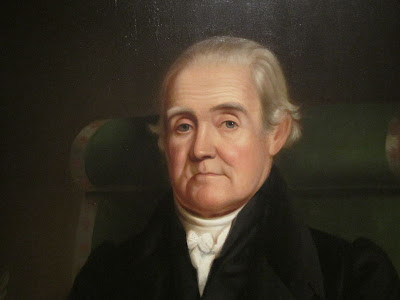There are lots of ways American spellings differ from the British: center vs. centre, theater vs. theatre, wagon vs. waggon, etc. American spellings seem simpler and more intuitive than their British counterparts.
The American versions of these words were codified by Connecticut's own Noah Webster. Webster was born in Hartford in 1758 to a well-off farm family, and was home schooled by his mother in mathematics, music, and spelling (of course). Webster attended Yale and got a law degree, but after floundering around for a while he eventually found his true calling as an educator, opening a school in Goshen and writing a speller, a grammar book, and a reading book for his students.
Webster strongly supported the American Revolution, and carried his political opinions into his educational work. He felt America should be free of European ornamentation and ostentation, so he simplified the spelling of words. Get that letter "u" out of "glamour" and "colour" - it's too showy! His spelling book sold over 15 million copies and created the tradition of spelling bees. He also thought America should be a rational nation, so his grammar book and reading book drew on secular stories rather than the Biblical tales that had been used in schools previously.
In 1825 Webster published An American Dictionary of the English Language, which had taken him fifteen years to compile. An American Dictionary contained 12,000 words which had never appeared in dictionaries before, including common American words like "skunk" and "squash" that had been omitted from British dictionaries.
 |
| Noah Webster |
Noah Webster clearly had a very impressive intellect, and made an enormous impact on the life of all Americans. As a result, folktales about his life were once very common. They have now mostly disappeared, but David E. Philips includes this one in his wonderful book Legendary Connecticut.
One day Noah's wife Rebecca needed their pretty young maid to run an errand, but she couldn't find her anywhere. Rebecca looked in the kitchen, she looked in the barn, and she looked in the orchard but the maid was nowhere to be seen.
 |
| Rebecca Greenleaf Webster |
The only room left unchecked was Noah's study. The door was shut, and Rebecca knew this meant her husband was hard at work on some intellectually strenuous project. The errand was urgent, though, so she quietly opened the door to her husband's study to see if the maid was inside.
She was, and Noah was passionately kissing her.
Rebecca cried out, "Noah, I'm so surprised!"
Noah turned to his wife, and always eager to demonstrate his masterful vocabulary said, "I beg to differ with you, my dear. I am surprised. You are astonished."
Neither tradition nor Legendary Connecticut record Rebecca's reply, but I'm sure many of her words were of the four-letter kind.
